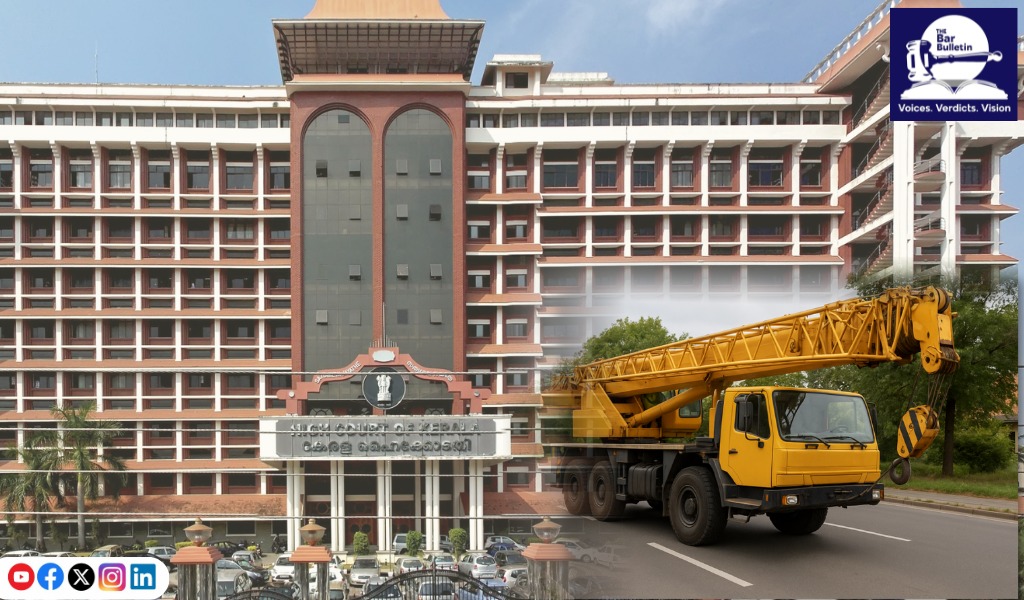An interesting question was raised before the High Court as to whether the crane and forklifts purchased by the plywood manufacturer (petitioner) only for the sole use inside the premises of the factory, is a motor vehicle as defined under Section 2(28) of the Motor Vehicles Act, which would require registration as mandated under Section 39 of the Motor Vehicles Act and taxable under Section 3 of the Kerala Motor Vehicle Taxation Act.
Answering in affirmation and applying the determinative test of road-adaptability, the Kerala High Court (Ernakulam Bench) ruled that the machinery, such as forklifts, mobile cranes, dumpers, or similar equipment, if structurally capable of being driven on roads even incidentally or occasionally, squarely falls within the definition of “motor vehicle” under the Motor Vehicles Act.
The Court clarified that the roadworthiness and adaptability, and not the actual use on roads, are the determinative tests for whether a machine falls within the definition of a motor vehicle; exclusive use inside factory premises does not take such machinery outside the definition if it is capable of being used on public roads.
Further, the exclusion clause under Section 2(28) of the MV Act applies only to machines exclusively designed for use within enclosed premises, rendering actual exclusive use irrelevant; and any machinery reasonably suitable for use on public roads remains a motor vehicle notwithstanding the claim that it is intended or designed for off-road or factory use.
A Single Judge Bench of Justice Mohammed Nias C.P., observed from the specifications of the machines that the forklift is equipped with a 48 HP (gross) engine operating at 2200 RPM, a 4-stroke, 4-cylinder, water-cooled diesel engine. It comprises accessories and standard equipment, of an automatic torque converter transmission, and an all-welded high-visibility overhead guard. The vehicle is further provided with a foot-operated hydraulic service brake, hand-operated parking brake, high water/coolant temperature indicator, and low engine oil pressure indicator.
Accordingly, the Bench concluded that the forklifts and crane owned by the petitioner are to be held as construction-equipment vehicles capable of movement on public roads and do not fall within the exclusion under Section 2(28). They therefore require mandatory registration under Section 39 of the Motor Vehicles Act, and once they fall within the definition of “motor vehicle,” liability under Section 3 of the Kerala Motor Vehicles Taxation Act necessarily follows, irrespective of alleged exclusive use within factory premises.
Briefly, the petitioner, a company engaged in the manufacture and sale of plywood and veneer at its factory in Ernakulam, uses two forklifts, purchased in 2005 and 2017, and a crane, purchased in 2002, exclusively for lifting and moving timber logs within its 6-acre factory premises. As per the petitioner, these machines function solely as material handling equipment inside the enclosed factory compound and are never used on public roads; therefore, they do not fall within the definition of “motor vehicle” under Section 2(28) of the Motor Vehicles Act, 1988, and do not require registration.
In the meantime, based on a complaint lodged by certain disgruntled workers alleging that the petitioner was operating two forklifts and a crane without valid registration or insurance, the 2nd respondent conducted an inspection, which confirmed that all three vehicles were unregistered, uninsured, and had not undergone fitness testing since their purchase in 2002, 2005, and 2017. This led to a direction for the stoppage of the equipment’s use. Contending that Section 39 of the Motor Vehicles Act mandates registration only for vehicles intended to be used “in a public place,” and since the equipment in question is operated exclusively within a private enclosed factory, the impugned direction is without jurisdiction.
The petitioner, therefore, sought for quashing of the direction and a declaration that the forklifts and cranes used solely within the petitioner’s factory for material-handling purposes do not come within the definition of “motor vehicle” under Section 2(28) of the Motor Vehicles Act and consequently do not require registration under the Act.
Appearances:
Advocates V. Krishna Menon, E.K. Madhavan, P. Vijayamma, J. Surya, and A.B. Beenu, for the Petitioner
Advocate Mohammed Rafiq, for the Respondent

